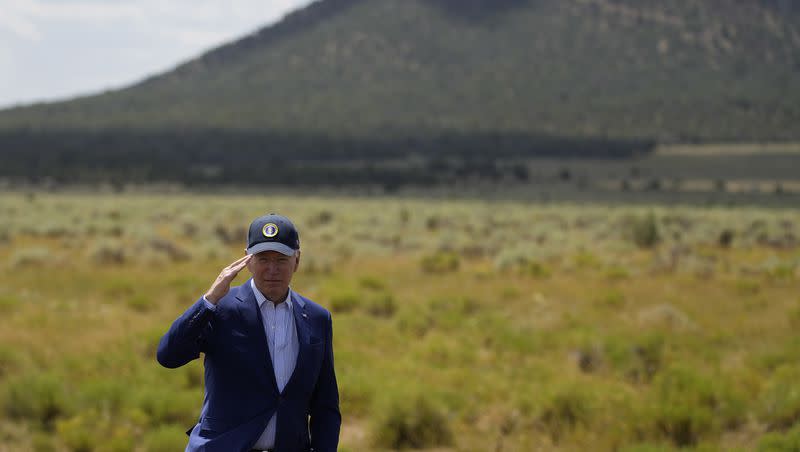Sens. Mitt Romney, Mike Lee criticize Biden designating a monument near Grand Canyon

- Oops!Something went wrong.Please try again later.
- Oops!Something went wrong.Please try again later.
Utah Sens. Mitt Romney and Mike Lee criticized President Joe Biden for designating a new national monument near the Grand Canyon on Tuesday.
“National monuments have become a political football tossed back and forth as presidential administrations change,” said Romney, a Republican. “President Biden’s proclamation of 1.1 million acres around the Grand Canyon in Arizona as a national monument continues the cycle of Antiquities Act abuse by the Executive Branch.”
The act allows presidents the authority to create national monuments on federal land in order to protect its cultural or natural resources.
Before signing the proclamation, Biden gave remarks at the Historic Red Butte Airfield in Arizona. The Deseret News is covering Biden’s three day swing through the West.
“By creating this monument, we’re setting aside new spaces for families to bike, hike, hunt, fish and camp,” Biden said. “Preserving these lands is good, not only for Arizona but for the planet, it’s good for the economy, it’s good for the soul of the nation.”
The new monument will be called Baaj Nwaavjo I’tah Kukveni Grand Canyon National Monument, protecting land that Native tribes consider sacred. Baaj Nwaavjo means “where Indigenous peoples roam” in Havasupai, and I’tah Kukveni means “our ancestral footprints” in Hopi, according to the Grand Canyon Tribal Coalition.
Related
Romney said that while the new monument sits in Arizona, it will impact ranchers in southern Utah counties like Washington and Kane that use the public lands on the Arizona Strip to graze their cattle.
These ranchers will now face “burdensome restrictions or be prevented from using the land altogether,” he said.
The monument designation also bans any new uranium mining claims in the area, known for its uranium mining and reserves.
The New York Times reported that around 1.3% of the U.S. uranium reserves are in this area. Still, Energy Fuels, a leading U.S.-based critical minerals company, tweeted late last month that the U.S. has nuclear plants but no domestic supply of uranium, with nearly 50% of it coming from Russia and its allies. The mineral is essential for nuclear energy.
“By eliminating this important source of uranium, President Biden has increased both our dependence on Russia and China and our ultimate carbon footprint, while decreasing our energy efficiency,” Romney said. “It is disappointing that with this proclamation, the President has once again ignored the concerns of those who live closest to the land.”
Related
Sen. Mitt Romney supports debt ceiling deal; Sen. Mike Lee says it doesn’t go far enough
Mitt Romney, other GOP senators want Biden to ‘finish the border wall’
Lee, a Republican, also said that the latest designation “is nothing short of a blatant misuse of the Antiquities Act, indicative of a poorly thought-out strategy with potentially catastrophic impacts.”
He concurred with Romney on the negative impact this decision would have on local grazers and miners, as well as on the limited “domestic sources of uranium, a critical component in carbon-free nuclear energy production.”
“This makes little sense in the context of our goals for energy independence and low-carbon power generation,” Lee added.
He said that the new designation points to “a disturbing trend toward top-down management that Democrat presidential administrations have consistently showcased,” that brushes off local stakeholders and doesn’t strike a balance “between conservation and practical realities.”
“It’s time for President Biden to reflect, revisit his tactics, and release the chokehold currently suffocating local livelihoods and our domestic energy productions, especially if he wants to decrease our dependence on sources from adversarial nations,” he concluded.
— Mike Lee (@SenMikeLee) August 8, 2023
Utah Gov. Spencer Cox also released a statement, saying the monument designation is “frustrating news” for Utahns living by the Arizona Strip. He called the “massive, landscape-scale” monument a “mistake.”
“These designations increase visitation without providing any additional resources for law enforcement and infrastructure to protect sensitive areas,” Cox said. “They also needlessly restrict access to the critical minerals that are key to cellphones, satellites, U.S. defense systems and so many other American Industries.”
He said that new designations, such as this one, should go through Congress as well as local leaders and residents — “a process that brings all voices to the table and offers the necessary funding.”

